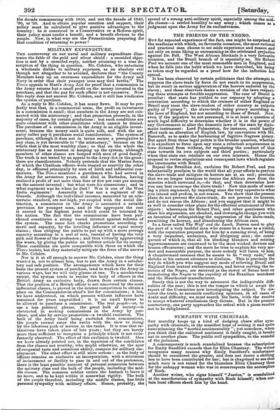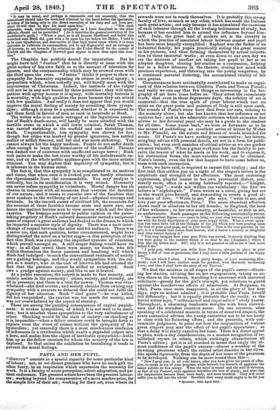SYMPATHY WITH CRIMINALS.
SET morality keeps up a kind of dodgingchace after sym- pathy with criminals, in the manifest hope of seizing it and quite exterminating the "morbid sentimentality "; yet somehow, when you think that the outlawed sentiment is fairly caught, it breaks out in another place. The public will sympathize, to the scandal of the judicious.
A. contemporary is much scandalized because the subscription for Emily Sandford exceeds that for Eliza Chastney. The writer recognizes many reasons why Emily Sandford's misfortunes should be considered the greater, and does not desire a shilling less to have been contributed for her ; but is chagrined to see that much more is not raised for the blameless Eliza Chastney than for the unhappy woman who was in somerespects the accomplice of Rush.
Another writer, who signs himself "Justice," is scandalized at the manifestation of sympathy with Rush himself; when cer- tain local officers shook him by the hand. "It may be usual, and perhaps is reasonable and not unseemly, that the executioner should take the wretched criminal by the hand before the spectators, in token of its being only in the direct execution of his duty and not from per- sonal that be lays his hand upon him." . . . . . "But such miserable, weak, undiscriminating sympathy as I have described in the other officials, should not be permitted." [As it unsettles the general conviction of the malefactor's guilt.] "When a man, as in all human likelihood and belief this wretched man Bush did, goes with a lie upon his lips before his Maker, I hold it to be most injudicious, and destructive of that high moral sense which it is most desirable to cultivate in communities, not to say disgraceful and an outrage to all decency, to act towards the criminal as the Under-Sheriff for the county of Norfolk and the Chaplain of Norwich gaol appear to have done upon this occa- sion!'
The Chaplain has publicly denied the imputation. But he might have told "Justice" that he is directly at issue with the great author of his own faith as to the amount of toleration for sinners, and the companionship which may be avowed even with the thief upon the cross. "Justice" thinks it proper to show no sympathy for humanity expiating its crimes in mortal agony ; a proposition which, when nakedly put, will hardly meet with the concurrence of Christians. Indeed, the instincts of the vulgar will not be in any sort bound by these punctilios: they will sym- pathize with agony because it is agony, with mortality because it is mortality, with high qualities the more because they are mixed with low qualities. And really it does not appear that you would improve the moral feeling of society by annulling these sympa- thies; although it may be a question whether it is expedient to call them forth in favour of men so sunk in turpitude as Rush.
The writer who is so much outraged at the lugubrious ameni- ties of Rush's death-scene, will hardly be more satisfied with the horrible scene in which a still lower criminal, Sarah Thomas, was carried shrieking to the scaffold and cast shrieking into death. Unquestionably, less sympathy was shown for her, though her crime was marked by greater ignorance, less settled malice or selfish forecast, and her end was more sickening. You , cannot always hit the happy medium. People do not suffer death often enough to learn the bienseances of the scaffold : Thomas was dashed out of existence with unaffected savage terror ; Rush took pains to make the last scene worthy of his melodramatic ca- reer, and on the whole public applause goes with the more artistic criminal. You may deplore that depravity of sympathy, but it is inherent in the human mind.
The fact is, that this sympathy is so complicated in its motives and tissue, that when once it is evoked you can hardly eliminate the objectionable from the commendable. You may analyze it critically, but in its manifestation it is very mixed. Humanity can never refuse sympathy to vicissitude. Mortal danger has its charms in common with all occasions that exercise the faculties of our nature ; and it seems to exercise two of the faculties that most conduce to the wellbeing of our kind—physical courage and fortitude. In the smooth career of civilized life, the occasions for the exercise of those faculties become more and more rare, and hence the instinct hurries men to view scenes which call for their exercise. The homage conveyed to public opinion in the pains- taking propriety of Rush's outward demeanour earned a reciprocal sense of respect : a great audience had flocked to the drama, to which he imparted a superior style of dignity. There was a tacit inter- change of respect between the actor and his audience. There was a sense too, that such qualities, better circumstanced, might have distinguished the actor on a better stage—a dim perception of the fact that Rush was expiating the imperfect systems of education which prevail amongst us. A still deeper feeling would have its way: in all that crowd there were many, no doubt, who felt within themselves the fierce passions and headlong will which Rush had indulged : to such the conventional restraints of society are a galling bondage, and they would sympathize with the cul- prit as a martyr, who at the cost of his own life had attested the fact that the passions cannot be stifled or extirpated. Such owe a grudge against society, and like to see it braved. At a public execution, the culprit is made to face eternity, and society assists in the ceremony : crime, society, and eternity, are all in presence, and there is a trial for power. Thomas was over- whelmed—she died craven ; and society shrinks from owning any sympathy with a creature so debased that she could not fulfil the dignity of her situation. Rush " died game"—he was killed, but not vanquished ; the convict was too much for society, and was not overwhelmed by the aspect of eternity. , These are among the puzzling consequences of capital punish- ment: it evokes sympathies, of which it is not well to be desti- tute; but it attaches those sympathies to the very embodiment of crime. Shocking would be the state of society—as shocking as it is impossible—when a fellow creature could be brought forth to expiate even the worst of crimes without the sympathy of the bystanders ; yet assuredly there is a most mischievous confusion of influences in a retribution which exalts a degraded culprit into a hero, and makes him the object of inevitable sympathies—holds him up as the fellow creature for whom the severity of the law is deplored. So that unless the exhibition be brutalizing it tends to pervert the moral feelings.



























 Previous page
Previous page